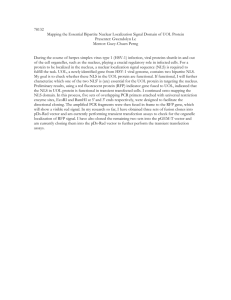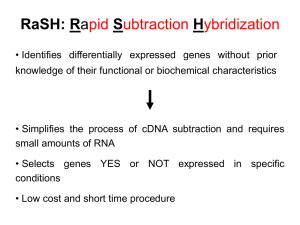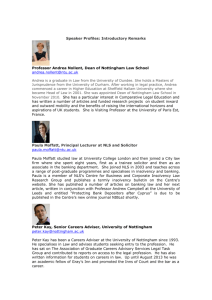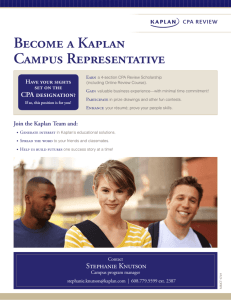Confirmed Bar Vocational Course Nottingham Law School Report of
advertisement
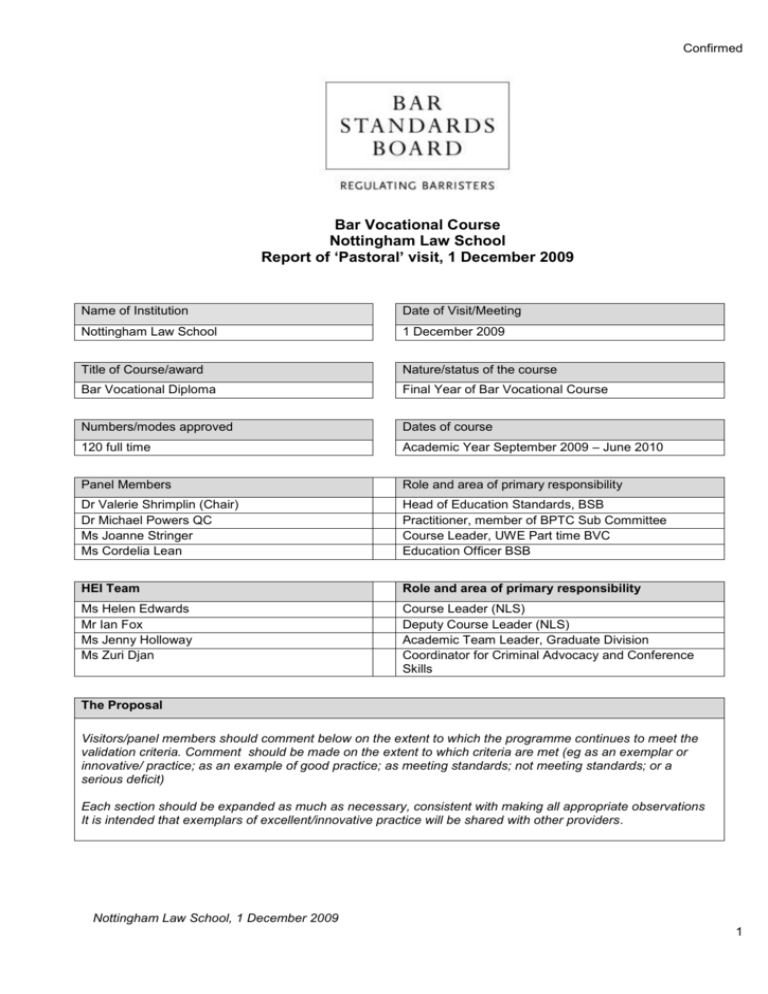
Confirmed Bar Vocational Course Nottingham Law School Report of ‘Pastoral’ visit, 1 December 2009 Name of Institution Date of Visit/Meeting Nottingham Law School 1 December 2009 Title of Course/award Nature/status of the course Bar Vocational Diploma Final Year of Bar Vocational Course Numbers/modes approved Dates of course 120 full time Academic Year September 2009 – June 2010 Panel Members Role and area of primary responsibility Dr Valerie Shrimplin (Chair) Dr Michael Powers QC Ms Joanne Stringer Ms Cordelia Lean Head of Education Standards, BSB Practitioner, member of BPTC Sub Committee Course Leader, UWE Part time BVC Education Officer BSB HEI Team Role and area of primary responsibility Ms Helen Edwards Mr Ian Fox Ms Jenny Holloway Ms Zuri Djan Course Leader (NLS) Deputy Course Leader (NLS) Academic Team Leader, Graduate Division Coordinator for Criminal Advocacy and Conference Skills The Proposal Visitors/panel members should comment below on the extent to which the programme continues to meet the validation criteria. Comment should be made on the extent to which criteria are met (eg as an exemplar or innovative/ practice; as an example of good practice; as meeting standards; not meeting standards; or a serious deficit) Each section should be expanded as much as necessary, consistent with making all appropriate observations It is intended that exemplars of excellent/innovative practice will be shared with other providers. Nottingham Law School, 1 December 2009 1 Confirmed Context: The HEI/Provider Nottingham Trent was granted University status in 1992. Nottingham Law School have been running the Bar Vocational course since 1997 and have been validated to run the BPTC from 2010. During AY 2007-08, a full 3 day visit took place (December 2007). In AY2008-09, an accreditation meeting/visit took place in May 2009. The May 2009 accreditation event was held at Kaplan Law School’s premises at London Bridge because Nottingham Law School is additionally seeking to run the BPTC in collaboration with Kaplan from September 2010. This arrangement has been validated subject to various conditions, particularly concerning resources, being met before the commencement of the course. The 1 December visit to NLS was not concerned with the accreditation of the arrangement with Kaplan to deliver the BPTC from the London Kaplan site, but an update on progress was provided (see below). The visit took place over one day with an evening meeting of the panel the night before to draw up an agenda of matters to discuss. By agreement with the Provider, the programme for the one day visit was adjusted in order to include some time for observation of classes, but with just one major meeting with management and staff combined. A meeting with students also took place, over lunch. A formal tour of resources was considered unnecessary due to familiarity with the premises, but the panel was shown round the Taylor building and also observed sessions in the Guildhall/courtroom. 1. Adherence to course aims, philosophy and standards Documentation submitted and available demonstrated adherence to the Course Specification Requirements and Guidance for the BVC (i.e. the ‘Golden Book’). Adherence to the BVC specification was demonstrated in meetings, as well as support for the new Bar Professional Training Course. A draft version of the Annual Monitoring Report, including statistical information on the 2008-09 cohort was made available. [The final AMR was subsequently submitted in December 2009 as required] 2. Quality management systems It was again confirmed that course quality assurance systems are closely entwined with the University systems. The Annual Monitoring Report has been to the faculty already (called the Programme Standards and Quality Report). The report includes the results of the students’ satisfaction questionnaire, and demonstrates how issues have been dealt with. Comments made by External Examiners were also addressed in the report, and at the meeting. One particular issue was a recommendation by an External Examiner to adjust the marks of the whole year in respect of one assessment due to his perception that the scripts he had seen were marked overly generously. NLS did follow the suggested route, but were uneasy about adjusting marks on papers that had not been seen by the external, and found some of the adjustments suggested to be rather arbitrary. The process of moderation and the need to adjust the whole set, for fairness, was discussed further. A quota approach was agreed to be totally inappropriate. In general, the QA systems appear to be working well. 3. Staffing and staff development A condition from the accreditation report in May 2009 was followed up, namely that strict staff training procedures should be in place, and should include recent practice experience. In response, NLS confirmed that all staff have post pupillage practice experience. In terms of training, a policy on practising certificates is being implemented which means staff have to display how they have used this to update themselves. It was noted that three members of (non BVC) staff who were not approved by the ATC in the past, had immediately stopped teaching Advocacy. One new member of staff this year took ATC accreditation almost as soon as she started and passed. Nottingham Law School, 1 December 2009 2 Confirmed 4. Curriculum content and structure Documentation available demonstrated adherence to the BVC curriculum content and structure. Students commented positively on the well laid out and presented materials provided. Civil materials are presented as the course goes along, whilst Criminal materials are provided at the start of the course. Many students commented that they find Civil Advocacy much more difficult than Criminal advocacy, largely because Criminal is more based on the facts of a particular case. Students did however confirm that they are well supported in dealing with the curriculum and content (see below). 5. Admissions and student profile The course is validated for 120 full time students, but numbers on the course appear to be falling - to 93 in 2008-09 and now to 92 in 2009-10. Helen Edwards, Course Director and in charge of admissions, felt that the main reason for the drop is the increase in competition in the geographical area, although students are recruited nationally. An additional reason is that NLS are realistic in their marketing approach. Students are provided with the ‘Inns health warning’ pointing out the challenges of succeeding at the Bar. They are encouraged to think seriously about their chances of professional success. Management have not put pressure on the Course leaders to recruit up to the course numbers; they support the approach that quality is more important. This is due to the nature of the Law School in Nottingham and the fact that they are able to balance the budgets between a number of different law courses. 6. Teaching and Learning (knowledge and skills areas) Students were very complimentary about the staff and standard of teaching. Some particular comments made by students included comment on the fact that the first part of Civil Litigation is heavily based on reading large numbers of chapters of the White Book and/or having it read to them. They felt that the White Book becomes much clearer when put in context, so the first weeks could have been better used. Students all agreed that teaching Civil advocacy alongside Civil litigation could be more beneficial, however staff felt this was not possible due to the size and range of the syllabus. A significant number of sessions were observed by panel members and all were rated as good or excellent in terms of session design and delivery, adherence to tutor notes, tutor input/checking of understanding and student participation For example, in the civil advocacy sessions, the materials provided (student session plans and materials and also the tutor notes) were of a very high standard. The learning objectives were clearly set out and achievable, although there was variation in the application of the use of the Hampel method. However, in both instances the feedback was detailed, appropriate and supportive. In not using the Hampel method, the tutor was able to address more than one issue to be improved upon by the student concerned. As is often the case, the timings of these sessions are tight but they were well run and managed. More time for a brief plenary session at the end for students to reflect up on what they had learned from both participating in the advocacy exercise and from watching their peers could have been helpful, to ensure that those not participating in the advocacy are remaining engaged in the session. Asking students to apply the assessment criteria and provide written feedback to the students carrying out the exercise helps ensure that all remain involved and focuses minds on the application of the assessment criteria to the exercise. Nottingham Law School, 1 December 2009 3 Confirmed 7. Standards and assessment strategy and methods (including progression data) Concerns were raised about the very low 1st sit pass rate for June 2009 (53%) which rose to approximately 90% after the September resit Board. This was attributed to efforts made by NLS to maintain standards and the very heavy assessment load in the second term. The student profile is good, so attention should be paid to the level at which standards are set. Many students have just one resit to concentrate on second time round and thus pass in September. Very few indeed have more than 2 resits and students also receive feedback on why they failed. The examination failed by most students at NLS is the Civil litigation 3 hour paper. The students that the panel met commented on some issues with about ‘half a dozen’ weak students (‘one or two’ in each group) with poor language skills. Students commented that the assessment criteria sometimes appeared vague, and some felt they were given insufficient information about what to expect or how they are to be assessed. Although details of the curriculum are made clear in handbooks, students felt there was no clear indication of the depth of knowledge they will need to pass the examinations (eg exactly how much detail of the White Book). There was a perception that the questions dealt with in class differ from those to be faced in the examinations. Past papers are not made available, due to the complexity of the case studies that have to be developed for assessment purposes. Students also mentioned time taken to receive individual written feedback on coursework which can take more than three weeks, resulting in students being unable to benefit from feedback before submitting further work. However students were provided with timely group feedback on the assessment in class. Students also commented on apparent discrepancies in the feedback they are being given. Some felt that feedback always focuses on the negative and where improvement is needed, rather than giving praise for what is done well, whilst others confirmed that they also received positive feedback. Advocacy tutors are changed after Christmas (which should assist with the range of feedback provided allowing for individual styles), but the students felt that more tutor changes would be helpful. This has been raised at the Staff Student Liaison Committee, but the School drew attention to the difficulties of moving students around too much as objective assessors are needed. Finally, with regard to assessment issues, one External Examiner had raised concerns that reasons for acceptance or rejection of mitigating circumstances did not appear to be considered or recorded, just whether they had been submitted. The view was that it is not possible to look behind medical evidence provided, but the dating sometimes needs consideration. NLS use a ‘fit to sit’ policy, which results in few applications for mitigating circumstances. Continuity is obtained by a member of the ‘Special Situations Panel’ attending the Examination Board. 8. Student support and quality of student experience The visitors met with a group of about ten students who were all student representatives. The majority of students present did not attend NLS for their LLB but came from a range of mainly pre 92 universities. About half had non law degrees plus GDL/CPE. All aimed to practice at the self employed Bar, apart from one who was as yet undecided. All the students felt able to speak to any tutor at any time if they had any concerns. They considered the Group sizes to be excellent. Meetings of the Staff Student Liaison Committee take place twice a term and concerns raised at the last meetings had been dealt with by the School. This contrasted with reports in previous years that matters used to take a long time to be addressed. As is common amongst BVC students, they felt that they are not given enough support to help them get pupillage, although one drew attention to a pupillage session (‘Interview training day’) run with local practitioners where the students were given feedback on their CV’s and pupillage application. This had been enormously helpful. In addition, there is good contact with the local Bar. Staff pointed out that there is to be a lot more help available, from the careers department and from further practitioner lectures that are going to be given next term. The pupillage success rate is second in the country, consistently above the national average, and always in the top three. Students were familiar with the attendance rule, which is checked with the use of signed registers. There were no problems with attendance of which the students were aware. Personal tutors are very sympathetic to Nottingham Law School, 1 December 2009 4 Confirmed students who are unable to attend a session due to illness, and they encourage the students to attend other sessions Pro bono work is mainly overseen by the LPC staff. The students felt that there was time to complete this work, as long as a student was organised. 9. Learning resources (Library and IT) The Taylor building is eminently suitable for the delivery of the Bar Course and provides an excellent ‘Chambers-like’ atmosphere, with appropriate resource facilities and court room furnishings etc. Sessions in the Guildhall courtrooms are also very beneficial in terms of conveying a formal atmosphere for advocacy exercises. Online and IT facilities appear to be somewhat limited (as has been commented on before) although developments are taking place. Students would like to see more of the papers they are supplied with made available online. There is access to the usual online resources and the timetable. Papers are also emailed to students. The Citrix system is generally not popular with students, especially with those who were familiar with Blackboard from their undergraduate courses. The use of a ‘very old’ version of Microsoft office causes compatibility problems with some students’ software at home but most students did not consider this a problem. The University are already looking at various Virtual Learning Environments (VLEs) and programmes to decide what they would like to implement, but the University’s present VLE is not used on the BVC. Instead they use a shared network drive to upload materials. There is a commitment to putting more material on these or new systems, including online advocacy demonstrations. During the accreditation meeting, reference was made to a commitment to a new VLE system in 2010. Library facilities meet requirements and the students had no concerns about library resources. There is no conflict with other students as the library in the Taylor building is purely for use of Bar Course students. NLS reported that the local Council is selling the Guildhall, which means they will no longer have access to the two court rooms in there. This is disappointing and the School are looking into what might be done or what other arrangements can be made. Refurbished facilities are currently being completed in an adjacent University building and NLS are therefore reviewing whether court rooms can be replicated here instead. 10. Equality and diversity No issues were identified in this area. Additional comments An update was provided on the collaborative arrangement with Kaplan for the delivery of the BPTC at the London Kaplan site from September 2010. This took place at the beginning of the meeting with management. It had not been expected or requested for the Course Director designate of the new course (James Wakefield) to attend, since a separate meeting to discuss Kaplan’s meeting of conditions set in May 2009 was scheduled for Spring/summer 2010. However, some informal information was provided about regular (fortnightly) meetings that were taking place between senior staff at NLS and James Wakefield, and covering things like staffing and resources. NLS staff are not directly involved in the recruitment of staff for the new course but they confirmed that the recruitment process will commence in January. The relationship with Kaplan is being discussed in detail (see separate report on the accreditation of the BPTC at Kaplan). It was queried whether Kaplan might be looking for a different kind of staff member than NLS. However, BSB criteria will be strictly applied and the interview process will include delivering a session. Nottingham Law School, 1 December 2009 5 Confirmed Good practice, distinguishing features The School was commended on: maintaining high recruitment systems and standards a very good staff student atmosphere the quality of students the high success rate of students at obtaining pupillage Conclusions: recommendation on accreditation/approval/continuing approval Continuing approval (with recommendations) For the period: September 2009 to July 2010 Recommendations Where recommendations are additionally made, please detail below: Recommendation 1 NLS are asked to keep the BSB informed about any changes in facilities within the course, such as the Court room Recommendation 2 As far as is practicable, the team should seek to ensure that students have access to different advocacy tutors and therefore different advocacy styles Recommendation 3 Consideration should be given to furthering the use of the existing (or new) Virtual Learning Environments. The BSB would like to receive a statement of what online resources are available from NLS and a copy of the updated online policy. Recommendation 4 NLS are asked to keep the BSB informed and updated about any developments with the proposal for delivery of the BPTC in collaboration with Kaplan (pending the event/visit to Kaplan in early summer 2010. Observations If any observations are made, to bring to the attention of the BSB, please detail below: Observation 1 NLS raised the issue of the fees payable to the BSB to run the Bar Course. On the BVC this is per capita according to the number of students. In order to disassociate the fee from individual students and to discourage excess numbers, on the BPTC this will be linked instead to the number of approved places, rather than actual students. NLS pointed out that this might mean that those who over recruit would benefit – but this would not be the case because any excess students would have to have their places approved (and fees for these places would thus be payable). Observation 2 NLS wished their concern about other providers over recruiting and packing in large numbers to be registered. They felt that prohibiting recruitment for a period would be a suitable sanction. First Draft: 06 January 2010 Approved by the Panel: 20 January 2010 Approved by the provider: 18 February 2010 Approved by Education and Training Committee: 20 April 2010 Nottingham Law School, 1 December 2009 6 Confirmed Response by the Provider (maximum one page) The record of the conversation between the Panel and the BVC managers reflects NLS’s concerns with regard to an External Examiner’s recommendations in respect of one of our assessments last year (Paragraph 2, Quality Management Systems). It is noted under Paragraph 6 (Teaching and Learning) that we said that it would not be possible to teach Civil Advocacy alongside Civil Litigation “due to the size and range of the syllabus”. There has been a misunderstanding: we do teach Civil Advocacy (and each of the skills) alongside Civil Litigation, our course is entirely integrated through three civil briefs. The Criminal course is integrated too, using four briefs. We disagree that a 1st sit pass rate at 53% is “very low” when compared with other Providers (paragraph 7). Based on the last available figures (2007, provided at the 2008 Providers’ Conference in Hinckley) all of the Providers bar one have a 1st time pass rate percentage between the mid 50s and the mid 60s. One Provider is markedly divergent with an 82% 1st time pass rate. The conversation between the Panel and students recorded a perception that the questions students face in class are different from those which they will face in their summative assessment. We would comment that the students were still at a relatively early stage in the Course and still had quite a lot of knowledge and procedure to learn. Further, they had not had any formative (mock) assessments at the time of the visit; the formatives are designed to reflect what students will do in the summatives. Another comment stated that students had commented that feedback was negative; this was not the Panel’s experience (“detailed, appropriate and supportive”, paragraph 6). With regard to assessment issues (last paragraph of ‘6’) an External Examiner had raised an issue about the separation of the Special Situation (Mitigating Circumstances) Board and the Examination Board. He felt that because only the first Board hears the student’s evidence, the Exam Board tends to infer that where there is evidence to support a student’s application, the student’s performance would have been affected. The External did comment that the “system did not seem to be being abused” and it is worth noting that it is difficult to go behind medical evidence. The University are continuing to look into the effect of this policy on the BVC. In addition to what is noted at ‘8’, we would add that we record attendance using signed registers at all Large and Small Group Sessions as required by the BSB. We are aware that not all Providers do this and wonder whether the BSB should be enforcing the requirement more strictly. It is recorded under Observations that we felt that “prohibiting recruitment for a period would be a suitable sanction”. This does not reflect our view. Rather, it seems that those Providers who recruit fewer students than their validated places are ‘punished’ disproportionately to those who over recruit. Paying the per capita £345 BSB fee is not a disincentive to over recruit students who pay in excess of £12,000 each. Our suggestion would be for a heavier fine, e.g., the course fees (or a proportion thereof) of the students who are recruited over validated numbers. Nottingham Law School, 1 December 2009 7
